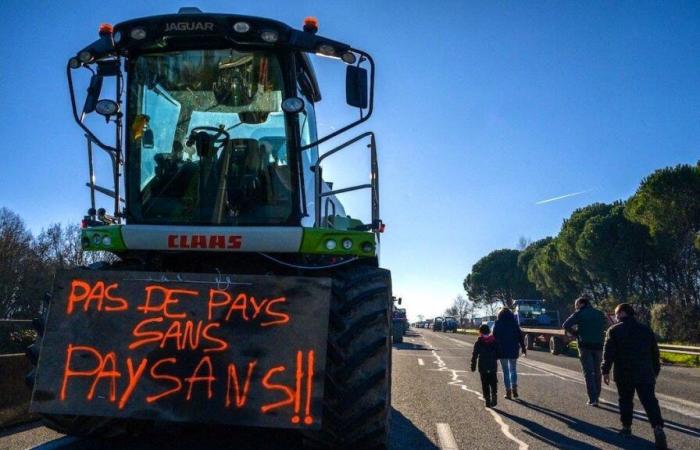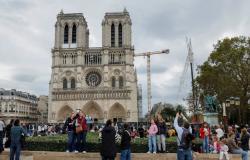French farmers are once again mobilized across the country, Monday November 18, 2024. (Archive image)
AFP
French farmers are once again mobilized across the country on Monday, less than a year after an unprecedented movement of anger in the countryside that the prospect of an agreement with Mercosur could once again ignite.
“85 demonstration points are getting underway, we do not want a concrete blockage as we saw last year,” Pierrick Horel, president of the Young Farmers (JA) said on Monday morning on RMC radio. ), citing as examples of actions “filter dams, fires of anger, demonstrations in front of prefectures”.
It was the majority alliance of agricultural unions (FNSEA-JA) which called for this national day of action.
On Sunday, Interior Minister Bruno Retailleau warned that there would be “zero tolerance” in the event of “sustainable blockage” of the roads.
Already in the evening, farmers went in a procession near the Villacoublay air base, near Paris, to denounce the proposed free trade agreement with the Mercosur countries, blocking two of the three lanes of traffic on the national 118, where some of them were still present Monday morning with their tractors after having spent the night there.
Yohann Barbe, spokesperson for the FNSEA, speaking to Europe 1 radio also on Monday morning, estimated that the scale of the movement was going to “be unprecedented again since we still feel that farmers are still as annoyed by a government who is slow to react.”
Less than a year after a vast movement of anger in the countryside, which resulted in January in blockages of sections of highways in the country, the agricultural unions are once again calling on their troops to demonstrate but in dispersed order, approaching their professional elections which will be held in January.
Hit by poor harvests and emerging animal diseases, they believe they have still not reaped the fruits of last winter’s anger.
And they consider the standards as complex as ever, and the income insufficient.
If taxes on agricultural fuel had been one of the catalysts for the mobilization last year, it is the outcome of the proposed free trade agreement of the European Union (EU) with the Mercosur countries (Brazil , Argentina, Uruguay, Paraguay, Bolivia) which could set things on fire this year.
Despite opposition from both the political class and French agricultural stakeholders, the EU seems determined to sign this agreement by the end of the year, which will notably allow Latin American countries to sell more beef, chicken or sugar without customs duties in Europe.
Several European countries, including Spain and Germany, want the agreement concluded, which would promote the export of cars, machines or pharmaceutical products from the European Union.
But French farmers fear unfair competition from products not subject to the strict environmental and health standards in force in Europe.
This is why the FNSEA and its ally JA chose to relaunch the mobilization on Monday and Tuesday, the dates of a G20 summit in Brazil.
In Buenos Aires, French President Emmanuel Macron affirmed on Sunday that France would not “sign as is” the free trade treaty.
Occupation of the Europe Bridge
On the ground, mobilization must take the form of gatherings in squares or roundabouts called “Europe”.
Thus, members of the FNSEA and JA from the Bas-Rhin department (east) plan to symbolically occupy the “Bridge of Europe” which connects the French city of Strasbourg to the German commune of Kehl.
“Our objective is not to annoy the French (…), nor to block them, even less to starve them as we have heard from a certain number of other agricultural unions,” underlined the president of the FNSEA Arnaud Rousseau, in reference to calls from certain officials of Rural Coordination (2nd agricultural union) who have proposed in recent days to “encircle” or “starve” certain metropolises such as Paris.
The Rural Coordination has chosen to wait until its congress is held (Tuesday and Wednesday) to amplify its mobilization.
The union, which claims to have gained thousands of new members since last year, promises “an agricultural revolt” with a “blockade of food freight” from Wednesday in the southwest if “no progress” is noted on the Mercosur file.
(afp)






